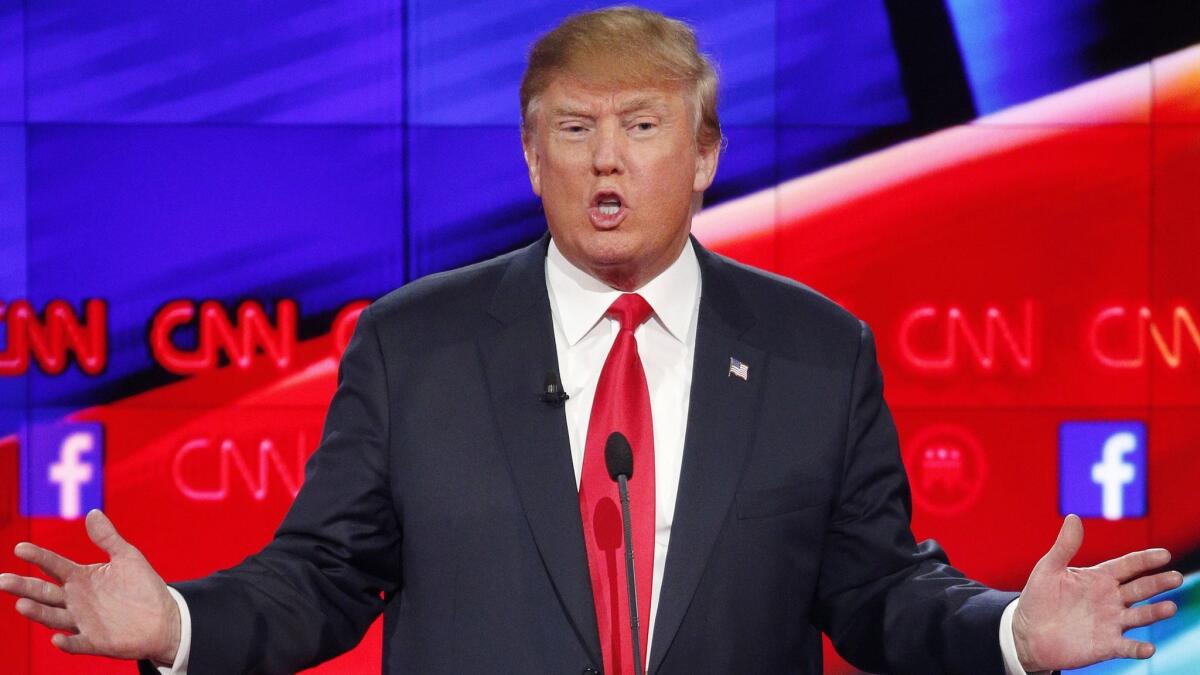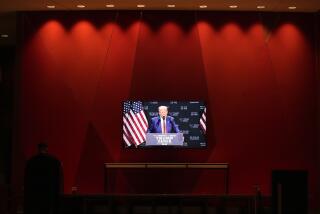Op-Ed: Journalists need to stop taking Trump’s bait

Since President Trump has taken office, reporting in the public interest has seen an encouraging resurgence. There is a renewed sense of purpose among reporters covering the White House and a renaissance in investigative journalism. All this should help burnish the media’s tarnished credibility.
But this good work is competing with a less admirable trend. The media have a bad habit of turning themselves into the story. And their tendency toward solipsism is as unbecoming as the president’s thin-skinned narcissism.
Often the president uses his Twitter account to insult journalists. In February he called the “FAKE NEWS media” the “enemy of the American People.” Recently this sniping has turned into a full scale assault: Trump slandered MSNBC’s Mika Brzezinski and celebrated violence against CNN — my former employer — by spreading a crude, doctored WWE video of the president body-slamming an embodied CNN logo.
These tweets are dishonest, sexist and disturbing. They violate traditional standards of respectability and show deep contempt for the free press. CNN’s senior media correspondent, Brian Stelter, has argued that the president aims to “tear down outlets that dare challenge him.”
Trump uses demeaning personal attacks to draw his targets off message and into an imbroglio on his terms.
Of course it’s tempting to respond, but dishonest, sexist and disturbing is just Trump being Trump. Commentators should understand by now that President Trump’s effort to brand traditional media “fake news” is akin to candidate Trump smearing his opponents as “Little Marco” and “Crooked Hillary.” He uses demeaning personal attacks to draw his targets off message and into an imbroglio on his terms.
While Hillary Clinton and Marco Rubio learned that engaging in this battle is neither constructive nor strategic, much of the press is ignoring those hard-won lessons and is itching to fight back. Entering this arena with the president is never a good idea.
For example, after reporting on Trump’s anti-CNN tweet for days, the network published an article about an anonymous Reddit user who posted one version of the body-slamming video. A line in the article seemed to suggest CNN might out or “doxx” the Reddit user, sparking an intense Twitter pile-on by the president’s online fans. CNN — originally the victim in this story — found itself on the defensive as newspapers around the country ran articles about journalistic ethics rather than the president’s outrageous behavior.
The fact that the media can’t win these fights isn’t the only reason to resist the impulse to fire back; when the Fourth Estate stoops to the president’s level, important news goes un- or under-covered.
The same day the media were busy clutching their pearls over the president’s vile tweet about MSNBC’s Brzezinski, the White House instituted its new travel ban.
The day the president ginned up outrage with the CNN body-slamming video, the Senate reportedly sent two new, secretly revised healthcare proposals to the Congressional Budget Office.
A new travel ban and changes to healthcare are consequential stories. But when viewers tuned in to cable news and Sunday shows, they were treated to heaping doses of media self-indignation at Trump’s slights.
During these convulsions of self-reflective coverage, the media appear to be more concerned with their own interests than the interests of the American public. That undermines their relevance to news consumers and feeds the unfortunate perception that the D.C. press is a self-interested elite.
Media defenders insist that intense coverage of the president’s war on journalism is warranted as a bulwark against encroachment on press freedoms. This is a legitimate concern. Real reporting is warranted when the administration takes actions that hinder the media’s ability to do their job. The president’s Twitter tantrums, however, hardly qualify.
Besides, Americans don’t need convincing that the president’s conduct is out of line. According to a recent Survey Monkey poll, a majority of Americans disapprove of his use of Twitter. An NPR/Marist poll shows that more than 70% of Americans believe civility in Washington has declined since Trump took office.
News organizations should therefore be more judicious about how much exposure to afford his attacks.
Instead of giving top billing to outrageous anti-media tweets, news outlets should dedicate more airtime to reporting about the president’s executive orders, new standards at the Environmental Protection Agency, knee-capping of the State Department through understaffing, plans to slash student aid and food stamp assistance, efforts to radically alter our healthcare system, and instability in the Middle East and on the Korean peninsula.
In a Supreme Court decision establishing new organizations’ right to publish the Pentagon Papers during the Vietnam War, Justice Hugo Black wrote that “the press was protected so that it could bare the secrets of government and inform the public.” The media would do well to keep this standard in mind as they decide when and how to cover Trump.
Stop taking the president’s bait. It’s a losing proposition.
Jessica Yellin is former CNN Chief White House Correspondent and a senior fellow at USC’s Annenberg Center on Communication Leadership and Policy.
Follow the Opinion section on Twitter @latimesopinion or Facebook
More to Read
A cure for the common opinion
Get thought-provoking perspectives with our weekly newsletter.
You may occasionally receive promotional content from the Los Angeles Times.










